Standup paddleboard racing has just missed its chance to be included in the Olympics for the Paris 2024 games. The list of proposed new sports released at the end of February again includes wave surfing, which appears at the Games for the first time in Tokyo 2020, but excludes SUP. The next hope to have Olympic paddleboarding won’t be until Los Angeles in 2028.
Who’s in charge around here?
If this seems too long to wait for one of our favorite watersports to receive Olympic recognition, blame the petty politics of the two international federations dueling for authority over America’s fast-growing sport. Paddleboarding’s Olympic future is officially on hold until the International Canoe Federation (ICF) and the International Surfing Association (ISA) can settle a bitter argument over which one should be the sport’s exclusive governing body.
Is SUP racing paddling or surfing? It seems like a silly argument paddlers could resolve with an arm wrestle or a coin toss over a pint, yet the disagreement between the ICF and the ISA has become so bitter and protracted the matter is now in the hands of lawyers at the Court of Arbitration for Sport (CAS) in Switzerland, with a decision expected sometime later this year. Until then, the International Olympic Committee is not entertaining any more submissions for Olympic paddleboarding.
ISA sees itself as the incumbent
The California-based ISA would seem to be a logical choice to be in charge of ushering SUP onto the world stage. The association, founded in 1964 and recognized by the International Olympic Committee as the World Governing Body for Surfing, brought surfing to the Olympics through patient lobbying efforts. It was a quest harkening back to 1912 when Olympic champion swimmer and father of modern surfing Duke Kahanamoku first pitched surfing to the IOC.
The ISA officially recognized SUP as a core discipline in 2008, hosting a SUP world championship annually since 2012. It claims to have invested $5 million into the sport, and successfully lobbied for SUP’s inclusion in the 2019 Pan Am Games, the 2019 ANOC World Beach Games, and the 2017 Central American Games. The ISA presented both SUP and surfing to the Tokyo 2020 organizing committee, but only surfing was selected, alongside four other new sports—karate, baseball, skateboarding and sport climbing—as part of the Olympics’ stated initiative to become more “youthful and vibrant.”
“As is clear, the ISA is the real long-standing sole governing body for standup paddle, and has existed as such without interference or objection for a decade. It is a shame, and a detriment to all involved in the sport, this governance has been challenged by the ICF,” said the ISA in a statement last summer.
ICF has other ideas
But the Johnny-come-lately to the Olympic paddleboarding scene, the Switzerland-based ICF, while accused of having no history or culture in the sport of SUP, comes well qualified as the Olympic governing body of paddlesports for nearly a century. It will celebrate its 100th anniversary in 2024. Sprint canoe has been in the Olympics since 1936, and slalom first appeared in 1972 and has been a permanent fixture since 1992.
“Given the long history of canoeing in the Olympics we believe we are the best equipped to fight for SUP’s Olympic future,” said the ICF’s spokesperson Ross Solly. “Currently the IOC is waiting for the CAS decision before it will start to entertain submissions. However, we are working very hard to ensure when the opportunity does present itself, we will be able to make a solid case for SUP to be included in the Olympics.” Despite the ISA’s fierce objections, last November the ICF congress voted unanimously to “continue to fight for the right to oversee standup paddling.”
Paddling vs. Surfing—which is it?
So, is SUP primarily paddling or is it surfing? The ISA’s definition of surfing comprehensively includes “Standup paddle (SUP) racing and surfing…and all other wave riding activities on any type of waves, and on flat water using wave riding equipment.” According to the ISA, even if you’re paddling a displacement-hull touring board on a calm cottage lake, you are still surfing.
The ICF claims, on the other hand, a person who uses a paddle as their primary form of propulsion is canoeing. According to Solly, “SUP is a natural fit for the ICF. It involves athletes standing with a paddle. As well as on the ocean, SUP also takes place on rivers and lakes, where surfing does not. Canoeing also includes ocean racing and surf ski, so we cover SUP in all forms.”
Negotiations to divvy up responsibility for the sport fizzled. The ICF says it proposed looking after flatwater and inland SUP racing and leaving SUP ocean events to the ISA, but that the ISA wasn’t having it. While the ISA claims it offered the ICF control of something called “Stand Up Canoe Racing.” After mediation failed last year, the issue escalated to a full CAS arbitration hearing.
Sometime in the last couple of years, the attention of the two governing bodies seemed to turn towards their political infighting at the expense of the growth and betterment of the sport itself. The ISA blames the ICF’s intervention for ruining its efforts to have SUP included in the 2018 Youth Olympic Games and other events. And in August 2018 the ICF was set to host its first SUP World Championships in Portugal when the ISA’s national affiliate stepped in to force its cancellation, getting Portugal’s court of sport to rule that only the national surfing federation could organize SUP events. It’s unlikely that anyone looking forward to racing in any of these events much cared whether it was organized by surf people or canoe people, as long as it was organized by someone.
Olympic paddleboarding may have to wait
It’s easy to conclude that none of this serves the cause of the sport itself or the core community of dedicated paddlers. Christopher Parker, editor of SUP Racer, in a pointed opinion piece called the feud “an all-out propaganda war that risks engulfing the community. And the first casualty is going to be the sport itself… The ICF and ISA are acting like selfish parents going through a messy divorce and arguing over custody of an adopted child. Nobody is asking what the child actually wants, and neither parent realizes their child moved out of home a year ago anyway.”
Parker points out SUP racing only counts for five percent of the sport as a whole and Olympic paddleboarding would only schedule a race or two every four years, so it’s questionable whether SUP paddlers should really care about the Olympics at all.
But in a world where most people don’t even know that SUP racing exists, the international profile of the Olympics would be a huge boost. And SUP, being a marginal underdog to both the paddling and surfing worlds, needs the deep pockets and political clout of one of the established international federations to play the Olympic game—paddlers probably don’t care which one, as long as that organization goes back to focusing on what’s best for the sport.
This article was first published in Issue 57 of Paddling Magazine. Subscribe to Paddling Magazine’s print and digital editions, or browse the archives.
On your mark, get set…wait until 2028 for Olympic paddleboarding. | Feature Photo: Georgia Schofield



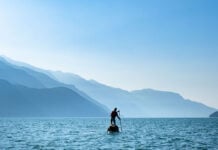
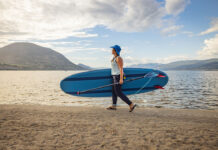
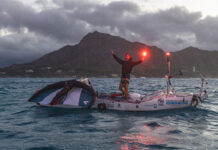
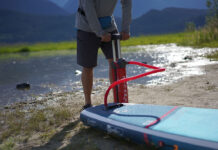
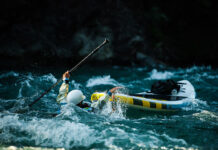

They don’t even have long distance / marathon canoe racing at the Olympics (which has been a long established sport). High kneel sprinting really has nothing to do with the canoe racing that is popular around the world. Why the OC add SUP when they won’t even add the well established sport of marathon canoe racing?